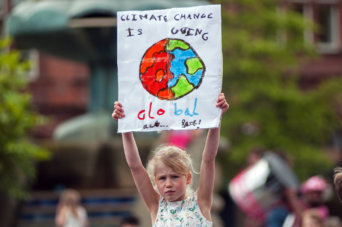- About
- Topics
- Story
- In-Depth
- Picks
- Opinion
- News
- Donate
- Signup for our newsletterOur Editors' Best Picks.Send
Read, Debate: Engage.
| topic: | Climate action |
|---|---|
| located: | USA |
| editor: | Yair Oded |
Last Friday, millions of people across the world walked out of schools and workplaces, and took part in the global climate strike. In 150 different countries, strikers demanded world leaders to take urgent action on climate change and end the era of fossil fuels.
Organized by Fridays for Future, a campaign urging kids to walk out of schools on Fridays in protest against governments’ inaction on climate change, the strikes took place two days before the UN General Assembly and Summit on Climate Action, in order to send a clear message to its delegates: enough is enough; take immediate action.
Greta Thunberg, the 16-year-old Swedish activist who constitutes a pivotal part of the movement to mobilise youths for climate action, marched in New York City along with an estimated 250,000 people. It has been reported that roughly 1.1 million students in New York City were given permission to skip school in order to take part in the climate strike.
Numerous political leaders and public figures have thrown their support behind the strike, including presidential hopefuls Julián Castro and Beto O'Rourke, both of whom joined the protests. "Climate change isn't a distant threat, it's already here. Following the lead of students like @GretaThunberg who I will be striking in solidarity with today, we must do everything to end it,” O’Rourke tweeted on Friday.
In addition to giving a speech at Friday’s rally, Thunberg delivered a visceral message at the UN Summit on Climate Action on Monday, in which she excoriated world leaders for their recklessness, greed, and failure to take meaningful action on climate change.
"We are in the beginning of a mass extinction and all you can talk about is money and fairy tales of eternal economic growth. How dare you?" said Thunberg. “You have stolen my dreams and my childhood with your empty words and yet, I'm one of the lucky ones. People are suffering, people are dying."
Later that day, Thunberg, along with 15 other children from 12 countries, filed a complaint with the UN against five of the world’s largest economies, claiming they violated their human rights under the Convention of the Rights of the Child, the most ratified human rights treaty in history. The complaint - lodged against Germany, France, Brazil, Argentina, and Turkey - blames the countries for violating the aforementioned treaty by failing to comply with their commitments under the 2015 Paris Agreement. The children argue that by not using their available resources to significantly cut down emissions, the five governments placed their health and livelihoods at risk.
Conspicuously missing from the complaint are two of the world’s largest emitters of carbon dioxide, China and the United States. The two countries could not be included in the kid’s complaint since they did not ratify the section of the treaty that allows children to seek justice for alleged violations.
While the climate strike has shed light on the commitment of millions around the world to conservation and climate justice, it also emphasised how reluctant are some leaders and corporations to transition away from polluting practices and energy production methods. Instead of pledging support for the strikers and their cause, the American president took to Twitter and mocked Thunberg. Furthermore, as millions across the world flooded the streets calling for an end of industrial pollution, top Republican lawmakers and leaders held private meetings and fundraisers with members of the fossil fuel industry in order to clarify where their loyalty lies.
Last week’s protests are a positive sign that a growing number of people comprehend the urgency and severity of the climate crisis. It should, however, mark the onset of a movement that is only beginning its demand for climate justice.
Let us not rest on imaginary laurels.
Photo: flickr/Tim Dennell

